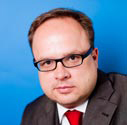The Dirty Secret of the U.S.-European Relationship

Jan Techau
The German Marshall Fund of the United States
Jan Techau is a senior fellow and director of the Europe Program at The German Marshall Fund of the United States (GMF). As a foreign policy analyst, his research focuses on European integration and the EU’s role in the world, German foreign policy, transatlantic relations, and security and defense issues. Techau is co-author of Führungsmacht Deutschland – Strategie ohne Angst und Anmaßung (2017) and a regular contributor to German and international news media. Before joining GMF, Techau was the director of the Richard C. Holbrooke Forum for the Study of Diplomacy and Governance at the American Academy in Berlin. From March 2011 to August 2016, Techau was the director of Carnegie Europe in Brussels. Techau also served in the NATO Defense College’s Research Division in Rome from February 2010 until February 2011. He was director of the Alfred von Oppenheim Center for European Policy Studies at the German Council on Foreign Relations in Berlin between 2006 and 2010, and from 2001 to 2006 he served at the German Ministry of Defense’s Press and Information Department. Techau holds an MA in political science from the Christian-Albrechts-Universität in Kiel, Germany. He is an associate scholar at the Center for European Policy Analysis (CEPA) and an associate fellow at the American Institute for Contemporary German Studies (AICGS) in Washington, DC. He lives with his family in Berlin.
Underneath the cloak of a never-ending list of foreign issues lies the heart of the transatlantic relationship: trade. According to the essay The Dirty Secret of U.S.-European Relations by Jan Techau, Director of Carnegie Europe and a frequent AGI program participant, this makes for a “boring” partnership, despite the general goodwill between both sides. However, with the economic crisis continuing to weaken the global positions of the U.S. and Europe, both sides will have to begin to build a more meaningful relationship to stave off their respective declines.









